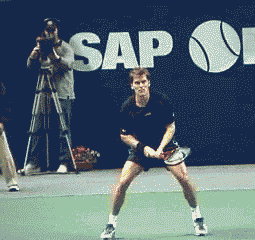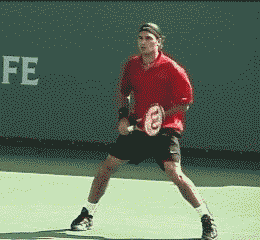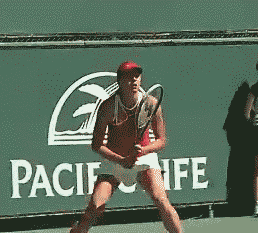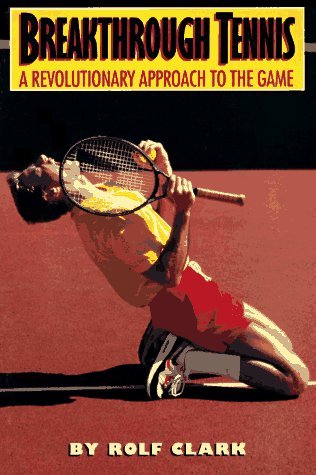TennisOne Lessons
![]()
Concentration Wins
Rolf Clark
Ernie is one of the best players I've ever known. When he was in his late 40's, he played only once or twice a week and never in the winter. Yet he beat most of the young professionals in his area.
He seldom missed a makeable shot. He rarely lost a match he should win. But once, when he did miss a forehand, I heard him mutter, "Hit the ball, not the court!" A remark that said a lot.
When he hit the ball, he knew he should concentrate on hitting the ball, not on where the ball should go, not on winning the point, not on anything else taking place on the court. Just his racquet hitting the ball. Hitting the ball is an action. Where it should go and how the point should end are results. Ernie concentrated on actions, not on results.
 Thomas Enqvist concentrates on hitting the ball. Hitting the ball is an action. Where it should go and how the point should end are results. |
Furthermore, he said "Hit the ball," not "Watch the ball." There's a subtle difference. To hit the ball you need to watch the ball and make your racquet meet it. Watching the ball is passive, merely watching it won't make the ball do anything. Hitting it is active, the player has to take the action of making the racquet hit the ball.
Finally, in muttering, "Hit the ball, not the court," Ernie revealed that he was aware of what his mind had been doing, aware of what he had and had not been concentrating on when he missed his forehand. He knew, after he missed, that he'd been concentrating on the wrong objective. Instead of focusing on hitting the ball, his mind had drifted off into thinking about where on the court he wanted to put the ball. Being aware of how you concentrate is the first step toward better concentration.
What Exactly Is Concentration?
Concentration is not the same thing as "looking at" or "watching." What we look at is not always what we are concentrating on. Our minds may be on something other than what we are visually focusing on.
As I walk down the sidewalk I look at what is ahead of me but my mind can be thinking about a meeting scheduled for later that morning. Playing tennis that way is not going to work.
If I am watching the ball but my mind is on the open court I want to hit to, I am not concentrating well. My mind should be on the same thing my eyes are watching, namely the ball. When hitting, I should watch the ball and focus my mind on driving the racquet through it.
"Focusing the mind" is not the same as "thinking about." You should not be thinking when you play, even if you're thinking about your tennis game. You should be paying attention to what you're doing. Thinking about the way you play is done off the court or while exploring your game during practice.
Let's explore these mental activities and the words describing them further.
 Top pros, like Roger Federer, have an uncanny ability to maintain focus on the ball in any situation. |
When you compete, your mind should focus on actions that cause you to hit the ball. When you practice, or play a match that you consider practice, your mind can observe what you're doing and compare your observations to what you are striving to achieve. In practice you can mentally focus on how your tennis feels. You can experiment with your game.
When you reflect on your tennis off the court or during practice, you may think about or analyze the way you play. You may decide, for example, that you need to employ more topspin or mix up your shots or follow through more fully.
But when you play to win, don't be observing or thinking or feeling. Be focused on reacting to your opponent's shots and on hitting through the ball.
Winning at tennis boils down ultimately to how you hit each ball. Hit the ball well every time, and you'll play well. That means concentration should be on playing each ball, not each point, not each game. Not on where to hit each ball. Just on driving your racquet through it. Hit each ball well and the points and games will take care of themselves. That also simplifies what you need to concentrate on.
Concentration in tennis requires distinguishing between actions and results. The right way to concentrate is to focus on actions. The wrong way is to think about results. Reacting, making your racquet hit the ball and recovering from your last shot are actions. These are specific things that you can do .
When hitting while competing, you do not want to concentrate -- even for a split second -- on such thoughts as winning the point or putting the ball into the open court. Those thoughts do nothing to help you hit the ball. They are not actions; they are desired results, wishes, goals. The way to achieve results is to concentrate on the actions that cause them, not on the results themselves.
You Won't Concentrate Like a Pro Unless You Are One
Tournament and other advanced players have hit so many balls that they don't need to concentrate in the same way that you and I do. Hitting the ball with the racquet's sweet-spot, for example, has become so natural to them that they can put their minds to other aspects of the game -- like tactics. Where is the best spot to hit the next ball? What kind of pace and spin can they put on the ball that will disrupt their opponents' play?
 Pros, like Maria Sharapova, have hit so many balls, they don't need to concentrate in the same way that you and I do. |
Most of us, however, cannot expect to win that way. Remember when you first learned to drive an automobile? Your attention was focused almost exclusively on keeping the car in your own lane and maintaining the right speed. Now you do that naturally, enabling you to turn part of your attention to other conditions and happenings on the road that could affect you.
It could be said that as an accomplished driver you're able to spend some of your time on road tactics, just as advanced players are expert enough to devote some of their attention to tennis tactics.
Accomplished tennis players keep the ball on the court while simultaneously paying some attention to their opponents, to ball placement, to deception and perhaps more. Don't expect to do the same until you've played so much that hitting the ball solidly is as natural as driving your car down the road. When you have reached that point then you can turn part of your attention to tactics.
Different Forms of Concentration
There are times you play to win, and times you play to practice. Your mental activities will be different for each. When you practice, your mind will be paying attention to what you are practicing. You might be focusing on timing, or on your racquet position as it meets the ball, or other aspects of the physical game. Or you might focus on what your thoughts are as you hit the ball. Then you'd be paying attention to the mental game. You'd be concentrating on how you concentrate. When you compete, however, your mind should not be on exploring either the physical or mental game. Your full attention should be on the actions needed to hit the next ball.
|
Click photo: When you practice, you might be focusing on timing, or on your racquet position as it meets the ball, or other aspects of the physical game. When you compete, however, your full attention should be on the actions needed to hit the next ball. |
Your concentration will be sporadic if you try focusing on too much at the same time. If, in addition to trying to be aware of the ball, you are also thinking about your opponent, the open court, where you should be positioned and whether you should hit to your opponent's backhand as well as keeping a firm wrist and moving your feet, you are going to end up confused. Your play will be erratic.
The trick is to focus on the one or two actions that are most effective for you. You will need to learn what those actions are for you. For most of us, the first action is to react to your opponent's shot, and the second is to drive your racquet through the ball.
Your comments are welcome. Let us know what you think about Rolf Clark's article by emailing us here at TennisOne.
![]()
 Dr. Rolf Clark taught systems thinking at The George Washington University and while there became a ranked senior tennis player. His book, Breakthrough Tennis, A Revolutionary Approach to the Game, approaches tennis from a “feel-your-swing” viewpoint, as opposed to a “do-the-mechanics” viewpoint. It argues that being aware of and exploring your own timing, balance, and concentration is crucial to achieving breakthroughs.
Dr. Rolf Clark taught systems thinking at The George Washington University and while there became a ranked senior tennis player. His book, Breakthrough Tennis, A Revolutionary Approach to the Game, approaches tennis from a “feel-your-swing” viewpoint, as opposed to a “do-the-mechanics” viewpoint. It argues that being aware of and exploring your own timing, balance, and concentration is crucial to achieving breakthroughs.
